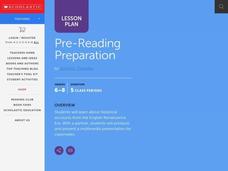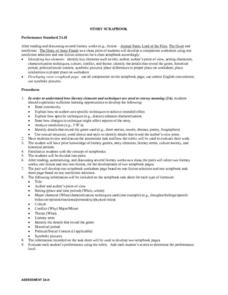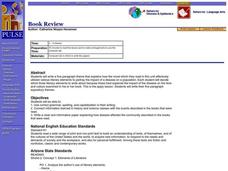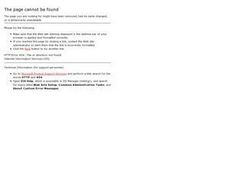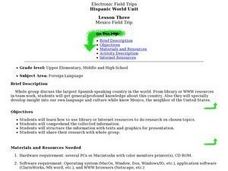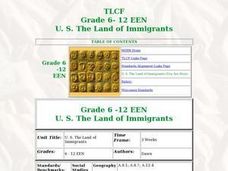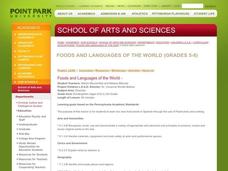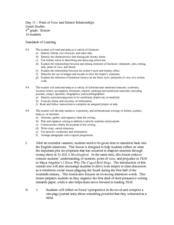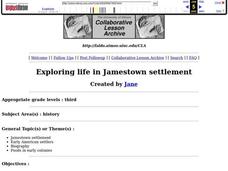Curated OER
Pre-Reading Preparation
Students explore a given historical fiction story. In groups, they research selected topics dealing with the story and determine what is fiction and what is fact. Students create a multimedia presentation about their findings and...
Curated OER
All About Almanacs
Use almanacs to entice your learners to explore non-fiction texts in celebration of Read-An-Almanac Month!
Curated OER
"Spelldown" by Becky Mushko
Learners read Spelldown, by Becky Mushko and consider how it portrays the Appalachian community. They define and discuss vocabulary presented in the story and write a comparison/contrast paper analyzing two of the story's characters. The...
Curated OER
Story Scrapbook
Learners develop a comparison worksheet using one non fiction book and one fiction book they have read to be put into a class scrapbook. In their comparison students must have title, author, point of view, setting, characters, and other...
Curated OER
Book Review
Students write a five paragraph theme that explains how the novel which they read in this unit effectively utilized various literary elements to portray the impact of a disease on a population. They then decide which three literary...
Turabian Teacher Collaborative
Parts of Argument II: Article Critique
Break down the parts of argumentative writing with a critical thinking activity. High schoolers read an article of your (or their choice), and use a graphic organizer to delineate the ways the author structures his or her arguments.
Curated OER
What It Means to Be an American Indian
Students analyze primary source documents and evaluate historical evidence to find consequences of the policies that were adopted from the 1830s to today regarding Native American Indians.
Curated OER
Examining Women's Roles through Primary Sources and Literature
Students interpret historical evidence presented in primary resources. In this women's history lesson, students examine the role of women prior to and following the suffrage movement. Students also read selected pieces of women's...
Curated OER
Red Legs: A Drummer Boy of the Civil War
Students identify and interpret the life of a drummer boy during the Civil War as well as about a reenactment. Students listen to a fictionalized story or a Civil War reenactor and compare ot with the life of the drummer boy the story...
Curated OER
Middle Ages Timeline
Learners research a historical figure from the Middle Ages. In this Middle Ages lesson plan, students present important events of their characters life and of the time. Learners write a time card for each significant...
Curated OER
Postcards from the Past
Students create postcards from the past by summarizing a historical event. Then they design illustrations for their postcards and send them off to another teacher at their school.
Curated OER
Mexico Field Trip
Explore how the library or Internet resources function as textual information. Young writers research a chosen topic then read and comprehend the collected information. They structure the information with texts and graphics for a...
Curated OER
Understanding Genres
Young scholars identify genres of literature. In this literature instructional activity, students read definitions of the various genres. Young scholars choose books and list clues in the texts that help them identify the appropriate genre.
Curated OER
European Exploration, Trade and Colonization
Students complete many activities including mapping, reading books, and Internet research to learn about European exploration. In this European lesson plan, students study geographical mapping, trade, and colonization.
Curated OER
The Land of Immigrants
Students access information and data about US immigration using the Internet and other sources. They identify from research data the countries from which the largest number of immigrants to the US come from and create a database of these...
Curated OER
Genre
In this genre study PowerPoint presentation, students read the definitions and characteristics of each literary genre. There are 17 genres that the PowerPoint presentation addresses, such as science fiction, tall tales and poetry.
Curated OER
Connection Stems
Students connect their lives to a story or nonfiction text. In this reading connections lesson, students make text-to-self, text-to-text, and text-to-world connections as they complete connections stems based on a story.
Curated OER
Go For The Gold!
Third graders read fiction and nonfiction works for comprehension. Using the internet, 3rd graders participate in a WebQuest. They compare and contrast the Olympics in ancient Greece to the modern day Olympics. Afterwards, students...
Curated OER
If These Walls Could Talk: Seeing a Culture Through Human Features
Pupils read Talking Walls and discuss the walls presented and their importance to the culture. In this geography lesson, students locate and label each country/continent discussed in the book on a world map. Pupils take a walk and point...
Curated OER
I Am What I Think I Am!
Students study conative and cognitive strengths through characters in literature. For this conative and cognitive strength lesson, students read about a favorite character or historical person. They make a chart of the difficulties the...
Curated OER
Foods and Languages of the World
Students review Mexico's location and language and learn to pronouns 10 new Spanish food words. Students listen as the book, Corn is Maize is read, touching and passing around an ear of Indian corn. Students discuss the contribution of...
Curated OER
Point of View and Mentor Relationships
Tenth graders analyze the role of mentors, point of view, and prejudice using the texts of To Kill a Mockingbird and Maya Angelou's I Know Why the Caged Bird Sings. In this literature analysis lesson, 10th graders review Scout's...
Curated OER
Exploring Life in Jamestown Settlement
Third graders locate Jamestown settlement on a historical timeline and research colonial life. They name a restaurant, identify who their potential customers might be and prepare a typical colonial menu.
Curated OER
Exploring Life in Jamestown Settlement
Students research a historic timeline and other texts to explore life in the colonies and the Jamestown settlement. Students investigate what the settlers ate while in the colony. Students prepare foods similar to colonists' foods.


